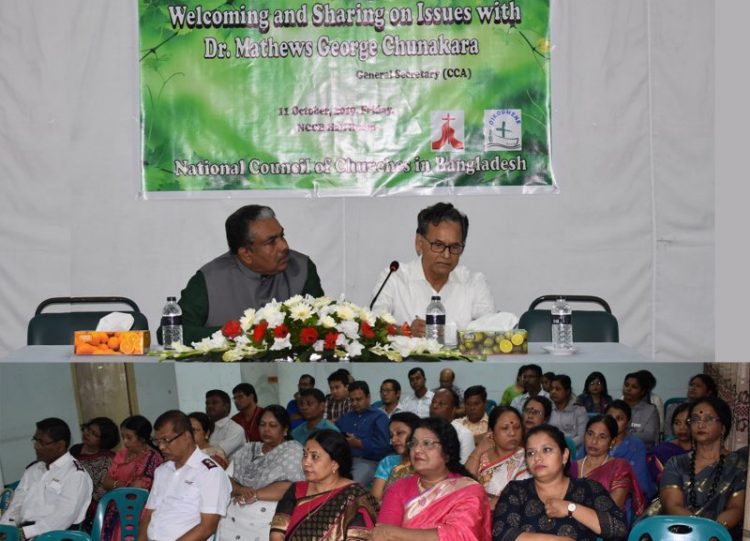“Are Churches in Asia getting more fragmented and disunited than ever before?” asks CCA General Secretary
 CCA General Secretary Dr Mathews George Chunakara addresses church and ecumenical leaders in Dhaka, Bangladesh
CCA General Secretary Dr Mathews George Chunakara addresses church and ecumenical leaders in Dhaka, Bangladesh
DHAKA, Bangladesh: “In today’s world of changing religious configurations, Christian churches cannot remain fragmented or be diametrically opposed to each other in the name of denominations or dogmatic arguments; but need to be stimulated by the faith and witness that embraces the value of ecumenism in its essence and totality, so as to face the emerging challenges in society,” stated Dr Mathews George Chunakara, the General Secretary of the Christian Conference of Asia (CCA).
While addressing a gathering of church and ecumenical leaders organised by the National Council of Churches in Bangladesh (NCCB) on October 11, the CCA General Secretary said that ‘traditional’ Christian countries in the West were experiencing a decline in Christianity, whereas the most spectacular growth of Christianity was now being seen in certain other continents, including Asia.
The CCA General Secretary further added that although the overall Christian population in Asia has increased in terms of sheer numbers during the past decades, the contemporary ecclesiastical disunity among the churches in Asia has warranted raising the serious and pertinent question, “Are Asian churches getting more fragmented and disunited than ever before?”
“Aggressive missionary evangelism is an increasingly pervasive trend in Asia and often portrays a negative image of Christianity in a multi-religious Asian continent; especially as such attempts recast Asian countries as missionary battlefields,” said Dr Mathews George Chunakara.
With regard to some of the practical difficulties and challenges of ecumenism and the ecumenical movement faced in Asia today, the General Secretary of the largest ecumenical body in the Asian continent remarked critically, “It is unfortunate that mission societies that were active in Asia during the last century have resurfaced in Asia with new structures, styles, and strategies; and are responsible for adding more disunity among Asian Christians. Confessional bodies that operate within denominational frameworks as well as sponsored or freelancing missionaries in Asia are equally responsible for dividing churches as they promote and further advance denominationalism. In fact, such attempts dismantle and destroy the ecumenical commitment of Asian churches instead of fostering unity in witness and mission.”
“Being a microscopic minority, the Church in Bangladesh cannot afford to be fragmented or disunited especially in the face of innumerable challenges faced daily, and where growing religious intolerance only adds to their uncertainty,” thus addressed the CCA General Secretary to the ecclesiastical and ecumenical leaders of the country assembled at the NCC Bangladesh headquarters.
Accompanied by the General Secretary of the NCCB, Rev David Deepak Doss, the CCA General Secretary earlier visited two other member churches of CCA at their headquarters in Dhaka, the capital city of Bangladesh.
In a Muslim-majority country, Bangladeshi Christians account for less than half a percent of the overall population of 160 million. Out of about 600,000 Christians in the country, most are Roman Catholics. About 250,000 Protestant Christians in the country are divided into more than sixty denominations and para-church groups. The National Council of Churches in Bangladesh, one of CCA’s member councils, is comprised of 19 member churches.










